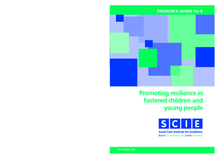WHAT: A guide to building a child-focused foster system that works with the strengths of children and young people to enhance their resilience and ability to cope with adversity. It outlines practical ways to support caring relationships and create positive educational experiences that bolster self-esteem and self-efficacy. It also identifies ways children and youth can participate in child care decision making and provide program/policy feedback.
WHO: Social and community workers, policy makers, teachers, foster caregivers, and legal monitors involved in the care and protection of children in foster or residential care.
WHERE: While this guide was created for child care professionals in the UK, it has global relevance in its presentation of an alternative, resilience-based approach to working with children and youth in foster care.
WHY: This guide outlines the important role a child care practitioner and foster care system have in building self-esteem and self-efficacy in children and youth. It gives examples of how practitioners can shift from working with problems to working with the strengths, potential and resilience of children and youth. It is helpful when engaging in debates about what policies and practices will best serve children and their families to enhance the likelihood of better, long-term outcomes.

